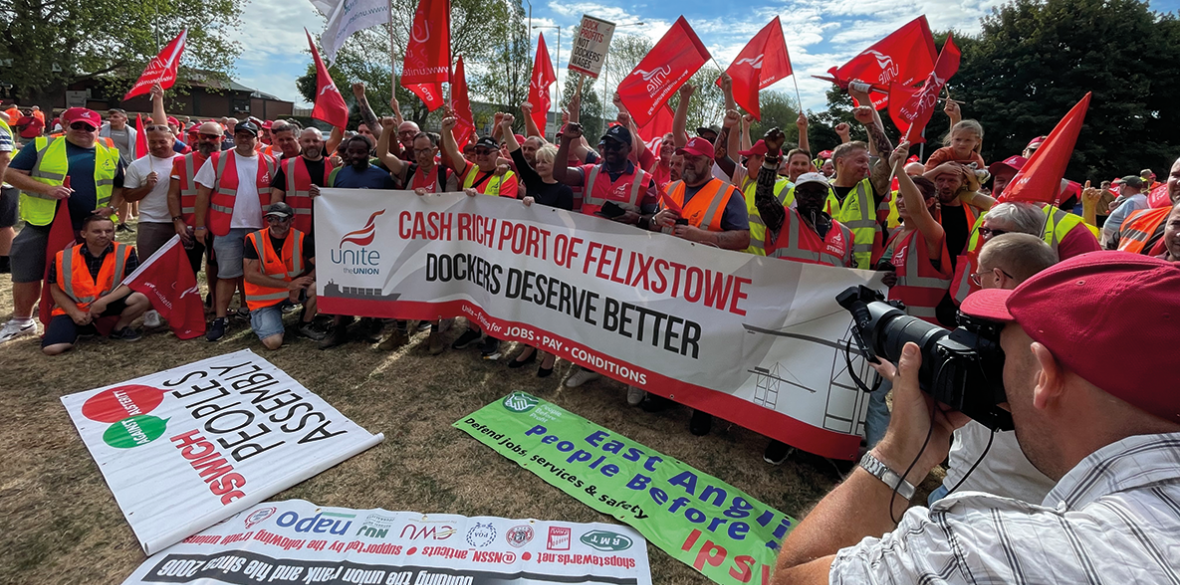This is the last article you can read this month
You can read more article this month
You can read more articles this month
Sorry your limit is up for this month
Reset on:
Please help support the Morning Star by subscribing here
THE history of trades councils is long and peppered throughout with incredible acts of steel and determination.
An organised working class, campaigning and agitating locally, has resulted in better workplace deals and outcomes for the communities in which the businesses operate and draw on their labour.
Over the years, these campaigns have led to improvements in workplace welfare, health and safety, local housing, transport, education and, of course, pay.
The organisational support offered by affiliated trade unions and their delegates, brought together through the work of committed volunteers fulfilling roles within the local trades councils, has repeatedly demonstrated to us over the years that it is one of the most effective vehicles for demanding change, all the while increasing their connections within local and diverse communities and unity across unions. Of that there can be no question.
Ipswich & District Trades Council, formed in 1885, has long been associated with the working-class struggle. It has a history of activism and agitation it can be proud of. Union affiliations accelerated during the London Dock Strike in 1889.
During his visit to the town, Tom Mann called on Ipswich dockers in the Dock Labourers Union not to be content until they got their “tanner” from the gas company bosses they were in dispute with who used the Ipswich port.
Roll forward to 2022 and the dock workers, some 2,000 of them, at Britain’s largest container port in Felixstowe, Suffolk, have walked out on strike for eight days in a dispute over pay.
Why? Well, it is worth noting that history has a habit of repeating itself.
As a result of the financial crash in 2008, these very same hard-working, highly skilled men and women agreed to a request from the Felixstowe Dock and Railway Company bosses that because of the hugely uncertain future of the economy the dockers would take a two-day unpaid holiday, thus relieving the company of immediate financial pressures due to low container volumes.
It later transpired that container shipping in and out of the port was not negatively affected as much as was predicted by the bosses. When the dockers asked for recompense for the lost wages, they were met with a solid No.
So, when the bad times occur, it seems that the dock company bosses want to work with unions, but when the company posts record profits while the dockers are suffering real hardship resulting from a cost-of-living crisis, the bosses ignore their requests for a wage increase, even one that falls short of the current rate of inflation.
It’s the first time in 30 years that the dock has seen industrial action on this scale. What is happening here in Felixstowe is that these dock workers are standing up just to stand still.
Representatives, activists and affiliated unions to the trades council have turned up at the picket lines each day since this strike began, showing solidarity with their sisters and brothers who are fighting for better pay.
The reaction from the striking workers to these solidarity visits has been incredible. They never thought that they would have ended up at a position where strike action would be necessary.
Phil Pemberton, Unite the union’s full-time convener at the port of Felixstowe, says: “I’ve got to say that I’m overwhelmed by the support we’ve received locally through the trades council, nationally, and internationally.
“From other unions, other organisations, from community groups and local businesses. It’s been nothing short of superb.”
Having visited the picket lines every single day, either on my way to or on my return from work, as an ordinary member of the public and local resident, I can honestly say that these proud men and women are the salt of the earth.
Their struggle is our struggle, and it is through local trades council acts of solidarity and organisation that the class war will be eventually won. We are all hoping for a swift and amicable settlement.
Victory to the Felixstowe dockers!
Mark Jones is a Unite the union London and Eastern regional executive member and secretary of Ipswich & District Trades Council.
Morning Star readers in the Ipswich area are invited to attend the local trades council Evening of Solidarity on October 20 at the popular venue, the Waterfront Building, 19 Neptune Quay IP3 0AQ. It starts at 7pm and already promises to be a landmark event in the struggle to regenerate trade unionism in the port town and the surrounding area.
Our guest speaker, in his first major public engagement, is Paul Nowak the incoming general secretary of the TUC. Organised workplaces like Felixstowe docks set the pace on wages and conditions in the surrounding area and play a key role in inspiring others to get organised. Paul knows this all too well, with his background in the Organising Academy.
His message will be listened to inside the building and in local media including community activist internet radio, the BBC and local newspapers such as the East Anglia Daily Times.
The evening is a trades council event and therefore, in addition to a large and well-spread representation of unions, will also be attended by local community groups and activists.
This is the cement that gives our trades council an aim and a sense of purpose. If you live locally, are a trade union or community activist in Suffolk, come to the meeting and play your part.








